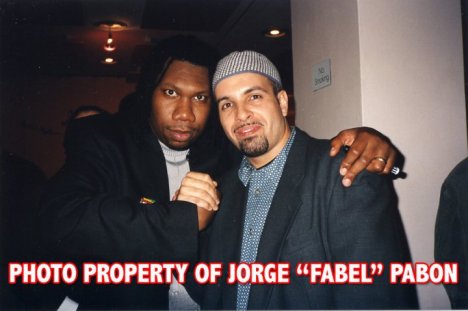“WE ARE ONE” -BY JORGE “POPMASTER FABEL” PABON
I would like to preface this speech with the overstanding that when I say Hip Hop, I am referring to the complete culture and not just the element of rap or emceeing.
In overstanding Hip Hop culture, we must overstand the various contributions and influences it has had since its origins. These influences and contributions are found in current and previous cultural forms of expression; from world to urban, social, political and economic dynamics; various religious traditions and ideologies; scientific development and many other historical references. Even after analyzing all of these points, one might still fall short of totally explaining the phenomenon of how one’s spirit relates and interacts with the universal rhythmic vibrations found in Hip Hop culture. However, we should try to acknowledge that which can be verified and stands true as fact.
In this quest for Peace, the Universal Zulu Nation continues to promote: Knowledge, Wisdom, Overstanding, Freedom, Justice, Equality, Peace, Love, Unity, Respect, Work, Fun, overcoming the negative to the positive, and other core principles.
These goals have become a reality within The Universal Zulu Nation as is clearly demonstrated by our international attendees and representatives at our yearly Anniversaries. Our chapters are scattered throughout the world, yet bound together through an overstanding and respect of each other’s individual cultures as well as our common culture, known as “Hip Hop”. The Universal Zulu Nation is also united, as we are today, in spirit and purpose. Our concerns for upliftment, of all people, are shared by many, as is evident in this gathering and other conferences designed to highlight the positive power and potential of Hip Hop culture.
In this quest for Peace, it is imperative that we acknowledge Hip Hop culture as a transcending force which belongs to those who create it, live it, support it, protect it, and promote it, regardless of their race, religion, nation, tribe, crew or organization. We might fly different colors, which represent our individuality and commitment to various parties or beliefs, but in truth, we all produce one collective mosaic, which creates the unity of this culture.
Although Hip Hop culture was, for the most part, initially celebrated by African and Caribbean descendants in the 1970’s, it was also embraced by various other ethnicities during this period, especially after it found its place above ground. For the true Hip Hoppers, our standards have never changed regarding who is “down by law” and who isn’t. One’s skills for speak for themselves, regardless of one’s skin tone or background. To us, it’s about being original and bringing something new to the elements while preserving the foundation set by the pioneers.
Hip Hop culture continues to unite people of various religions, nations, and cultures through the universal languages of dance, art, music, fashion and many other tools. The fact that Hip Hop is not a religion, philosophy or belief system gives us a neutral platform to unite upon. It is inclusive and has always consisted of various influences.
Peace can be achieved by respecting each other’s differences, uniting in our commonalties, and agreeing to disagree with each other’s opinions and views. Hip Hop culture has not only given us a vehicle of expression, but when used positively, it has given us an opportunity to explore the world and change the lives of many. It has helped many of us overstand ourselves as well as others. It has helped to educate us and challenge our views. It has given many the opportunities to become self-empowered. It has given us many ways to communicate with our youth and has helped us to exercise and stimulate their senses. The outcome of these efforts often brings about a strong conscious generation of individuals who have found peaceful ways to settle differences and who stand for the upliftment of their community.
Unfortunately, Hip Hop culture has been misrepresented by the media and those who are either ignorant or have a hidden agenda. In this quest for peace, we shouldn’t depend soley on the media for information about Hip Hop culture, since there have been many cases where the media has helped to promote division and corruption within the culture. We should not rely on sources who have no authority, knowledge or overstanding regarding Hip Hop culture’s origins and evolution. We should make it our business to research, cross-reference and fact check all of the pieces to this great puzzle. With this we can become students of the culture. Ultimately I have found that the most honorable teachers continue to be great students.

